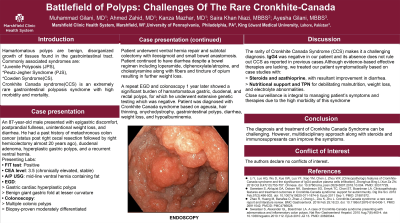Tuesday Poster Session
Category: Colon
P3120 - Battlefield of Polyps: Challenges of the Rare Cronkhite-Canada Syndrome
Tuesday, October 24, 2023
10:30 AM - 4:00 PM PT
Location: Exhibit Hall

Has Audio
- MG
Muhammad Gilani, MD
Marshfield Clinic
Marshfield, Wisconsin
Presenting Author(s)
Muhammad Gilani, MD1, Ahmed Zahid, MD1, Kanza Mazhar, MBBS1, Saira Khan. Niazi, MBBS2, Ayesha Gilani, MBBS3
1Marshfield Clinic, Marshfield, WI; 2University of Pennsylvania, Marshfield, WI; 3King Edward Medical University, Lahore, Punjab, Pakistan
Introduction: Hamartomatous polyps are benign, disorganized growth of tissues found in the gastrointestinal tract. Commonly associated syndromes are Juvenile Polyposis (JPS), Peutz-Jegher Syndrome (PJS), and Cowden Syndrome(CS). Cronkhite Canada syndrome(CCS) is an extremely rare gastrointestinal polyposis syndrome with high morbidity and mortality.
Case Description/Methods: An 87-year-old male presented with epigastric discomfort, postprandial fullness, unintentional weight loss, and diarrhea. He had a past history of metachronous colon cancer (status post right cecal resection followed by right hemicolectomy almost 20 years ago), duodenal adenoma, hyperplastic gastric polyps, and a recurrent ventral hernia. His presenting labs were significant for a positive FIT test, chronically elevated CEA level stable at 3.5 due to his history of colon cancer, and a mid-line ventral hernia containing fat on abdominopelvic ultrasound. An EGD showed biopsy-proven gastric cardiac hyperplastic polyps and a giant gastric fold at lesser curvature negative for malignancy. A colonoscopy revealed multiple colonic polyps and a biopsy-proven moderately differentiated adenocarcinoma of the ascending colon. Patient underwent ventral hernia repair and subtotal colectomy with ileosigmoid and small bowel anastomosis. Patient continued to have diarrhea despite a bowel regimen including loperamide, diphenoxylate/atropine, and cholestyramine along with fibers and tincture of opium resulting in further weight loss. A repeat EGD and colonoscopy 1 year later showed a significant burden of hamartomatous gastric, duodenal, and rectal polyps, for which he underwent extensive genetic testing which was negative. Patient was diagnosed with Cronkhite Canada syndrome based on ageusia, hair thinning, onychodystrophy, gastrointestinal hamartomatous polyps, diarrhea, weight loss, and hypoalbuminemia.
Discussion: The rarity of Cronkhite Canada Syndrome (CCS) makes it a challenging diagnosis. IgG4 was negative in our patient and its absence does not rule out CCS as reported in previous cases. Although evidence-based effective therapies are lacking, we treated our patient symptomatically based on case studies with steroids and azathioprine, with resultant improvement in diarrhea. Nutritional support and TPN were initiated for debilitating malnutrition, weight loss, and electrolyte abnormalities. Close surveillance is integral to managing patient's symptoms and therapies due to the high morbidity of this syndrome.

Disclosures:
Muhammad Gilani, MD1, Ahmed Zahid, MD1, Kanza Mazhar, MBBS1, Saira Khan. Niazi, MBBS2, Ayesha Gilani, MBBS3. P3120 - Battlefield of Polyps: Challenges of the Rare Cronkhite-Canada Syndrome, ACG 2023 Annual Scientific Meeting Abstracts. Vancouver, BC, Canada: American College of Gastroenterology.
1Marshfield Clinic, Marshfield, WI; 2University of Pennsylvania, Marshfield, WI; 3King Edward Medical University, Lahore, Punjab, Pakistan
Introduction: Hamartomatous polyps are benign, disorganized growth of tissues found in the gastrointestinal tract. Commonly associated syndromes are Juvenile Polyposis (JPS), Peutz-Jegher Syndrome (PJS), and Cowden Syndrome(CS). Cronkhite Canada syndrome(CCS) is an extremely rare gastrointestinal polyposis syndrome with high morbidity and mortality.
Case Description/Methods: An 87-year-old male presented with epigastric discomfort, postprandial fullness, unintentional weight loss, and diarrhea. He had a past history of metachronous colon cancer (status post right cecal resection followed by right hemicolectomy almost 20 years ago), duodenal adenoma, hyperplastic gastric polyps, and a recurrent ventral hernia. His presenting labs were significant for a positive FIT test, chronically elevated CEA level stable at 3.5 due to his history of colon cancer, and a mid-line ventral hernia containing fat on abdominopelvic ultrasound. An EGD showed biopsy-proven gastric cardiac hyperplastic polyps and a giant gastric fold at lesser curvature negative for malignancy. A colonoscopy revealed multiple colonic polyps and a biopsy-proven moderately differentiated adenocarcinoma of the ascending colon. Patient underwent ventral hernia repair and subtotal colectomy with ileosigmoid and small bowel anastomosis. Patient continued to have diarrhea despite a bowel regimen including loperamide, diphenoxylate/atropine, and cholestyramine along with fibers and tincture of opium resulting in further weight loss. A repeat EGD and colonoscopy 1 year later showed a significant burden of hamartomatous gastric, duodenal, and rectal polyps, for which he underwent extensive genetic testing which was negative. Patient was diagnosed with Cronkhite Canada syndrome based on ageusia, hair thinning, onychodystrophy, gastrointestinal hamartomatous polyps, diarrhea, weight loss, and hypoalbuminemia.
Discussion: The rarity of Cronkhite Canada Syndrome (CCS) makes it a challenging diagnosis. IgG4 was negative in our patient and its absence does not rule out CCS as reported in previous cases. Although evidence-based effective therapies are lacking, we treated our patient symptomatically based on case studies with steroids and azathioprine, with resultant improvement in diarrhea. Nutritional support and TPN were initiated for debilitating malnutrition, weight loss, and electrolyte abnormalities. Close surveillance is integral to managing patient's symptoms and therapies due to the high morbidity of this syndrome.

Figure: Endoscopy
Disclosures:
Muhammad Gilani indicated no relevant financial relationships.
Ahmed Zahid indicated no relevant financial relationships.
Kanza Mazhar indicated no relevant financial relationships.
Saira Niazi indicated no relevant financial relationships.
Ayesha Gilani indicated no relevant financial relationships.
Muhammad Gilani, MD1, Ahmed Zahid, MD1, Kanza Mazhar, MBBS1, Saira Khan. Niazi, MBBS2, Ayesha Gilani, MBBS3. P3120 - Battlefield of Polyps: Challenges of the Rare Cronkhite-Canada Syndrome, ACG 2023 Annual Scientific Meeting Abstracts. Vancouver, BC, Canada: American College of Gastroenterology.
